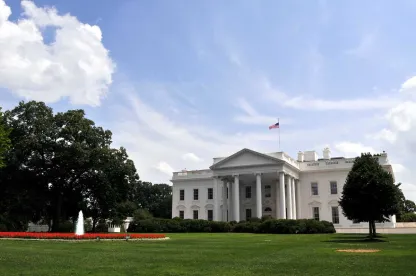Go-To Guide:
White House issues Executive Order intending to restrict American companies’ ability to make investments in certain Chinese high-tech sectors, particularly quantum computing, artificial intelligence, and semiconductors.
The Executive Order is an attempt to minimize vulnerabilities in U.S./shared information technology systems and networks that frequently come as part of a joint venture, investment, or development project.
The Executive Order comes after a recent Senate vote on an amendment to the National Defense Authorization Act, requiring disclosure of investments or acquisitions involving entities in China, Russia, Iran, and North Korea in six key technology sectors.
On Aug. 9, 2023, the Biden administration issued a long-anticipated Executive Order restricting equity, venture capital, and joint venture investments in China. The Executive Order on Addressing United States Investments in Certain National Security Technologies and Products in Countries of Concern (the EO) for the first time will prohibit certain U.S. outbound foreign investment transactions, and in other cases will require notification to the U.S. government, of transactions in “countries of concern.” As of today, the specified “countries of concern” are defined as the People’s Republic of China, including Hong Kong and Macau. The new prohibitions are not yet in effect pending completion of the rulemaking process, which likely will occur in 2024.
The EO’s release comes days after reports surfaced that Beijing hacked Japan’s classified defense networks and a week after the Pentagon announced it was searching its own networks for malware inserted by China to disrupt U.S. military operations and critical infrastructure. Experts note that these attacks undermine U.S. national security and increase China’s military and technological advantages in the event of a conflict. The goal of the order is to prevent U.S. capital and expertise from accelerating the development of technologies that would support China’s military modernization, technological advantage, and continued malicious cyber activity.
Prohibition of Certain Outbound Investments
Under the authorities of International Emergency Economic Powers Act (IEEPA), the National Emergencies Act, and 3 U.S.C. § 301, the EO declares a national emergency to deal with the threat of advancement by countries of concern in sensitive technologies or military, intelligence, surveillance, and cyber-enabled capabilities. The EO directs the Department of the Treasury (Treasury) to (1) prohibit certain transactions that involve covered national security technologies and products; and (2) require notification of certain transactions involving covered national security technologies and products. The EO identifies the following areas of concern that will be subject to the new requirements: (1) semiconductors and microelectronics, (2) quantum information technologies, and (3) artificial intelligence. The EO is limited to sensitive technologies and products that are critical for the military, intelligence, surveillance, or cyber-enabled capabilities of a country of concern. The EO directs Treasury to (1) consult with the Secretary of State, the Secretary of Defense, the Secretary of Commerce, the Secretary of Energy, and the Director of National Intelligence on the “implications for military, intelligence, surveillance, or cyber-enabled capabilities of covered national security technologies and products and potential covered national security technologies and products;” (2) maintain communication with Congress and the public; (3) investigate potential violations; and (4) pursue appropriate penalties for violations.
Treasury is authorized to prohibit or require notification of instances where a U.S. person or entity engages in a covered transaction with a covered foreign entity. Concurrent with the issuance of the EO, Treasury released an Advanced Notice of Proposed Rulemaking (the ANPR), which sets forth Treasury’s proposed framework and considerations for implementing the EO. This is not the proposed rule itself, but rather a request for feedback from stakeholders on the proposed implementation of the program.
The ANPR sets forth the broad contours of the proposed prohibitions and notification requirements to be undertaken by Treasury, but solicits extensive feedback on most components of the new regime, including jurisdictional scope, definitions, and other key components. This means the exact scope of the new measures remain under development, and until a final or interim final rule is published, most of these details are to be determined.
The proposed program is reminiscent of the U.S. inbound investment review regime administered by the Committee on Foreign Investment in the United States (CFIUS). CFIUS is tasked with reviewing certain foreign investments in U.S. businesses, including some of those in the sectors identified under the EO. While it appears that the new program will not be tied to CFIUS, the proposed structure of the new outbound investment program will likely reflect the same expectation present in CFIUS that the parties to a transaction will have the obligation to determine whether a given transaction is prohibited, subject to notification, or permissible without notification. The proposed penalties of the EO also match those imposed for failing to comply with CFIUS regulations. Importantly, the ANPR states that the regulatory provisions prohibiting specific transactions and requiring notification of others will not be applied retrospectively.
Key Definitions of the EO and the ANPR
-
U.S. Persons: The order defines a “U.S. person” as all U.S. citizens and lawful permanent residents (green card holders) regardless of where they are located, all entities organized under the laws of the United States, all U.S. incorporated entities and their foreign branches, and any person in the United States.
-
Covered Foreign Person: A “person” includes any entity or individual that is a citizen or permanent resident of a country of concern (and not a U.S. citizen or permanent resident); an entity with its principal place of business or incorporated in a “country of concern”; the government of a “country of concern”; or an entity in which an individual or entity in the above categories holds an ownership interest equal to or greater than 50%.
-
Country of Concern: In an annex to the EO, the People’s Republic of China is identified as a country of concern, alongside the Special Administrative Regions of Hong Kong and Macau.
-
Covered Transactions: Treasury proposes to cover (1) acquisition of an equity interest or contingent equity interest in a covered foreign person; (2) provision of debt financing to a covered foreign person where such debt financing is convertible to an equity interest; (3) greenfield investment that could result in the establishment of a covered foreign person; or (4) establishment of a joint venture, wherever located, that is formed with a covered foreign person or could result in the establishment of a covered foreign person.
Covered Transaction Exemptions
Treasury intends to exempt the following from the definition of a covered transaction:
-
an investment into a publicly traded security;
-
an investment into an index, mutual, or exchange traded fund;
-
an investment made by a limited partner in a pooled investment fund;
-
the acquisition of equity or other interest owned or held by a covered foreign person in an entity or assets located outside of a country of concern where the U.S. person is acquiring all interests held by the covered foreign person; or
-
an intracompany transfer of funds from a U.S. parent company to a subsidiary located in a country of concern.
Treasury also plans to exempt any transactions made pursuant to a binding, uncalled capital commitment entered into prior to the date of the EO.
Restricted Sectors
Covered transactions are limited to the categories of technologies and products enumerated in the EO:
-
Semiconductors and Microelectronics: Treasury proposes prohibiting transactions related to covered semiconductor products and a notification requirement for other products.
|
— |
Treasury proposes prohibiting transactions related to the following activities: (1) technologies that enable advanced integrated circuits; (2) advanced integrated circuit design and production; and (3) supercomputers. |
|
— |
Treasury proposes requiring a notification for transactions involving integrated circuit design, fabrication, or packaging. |
-
Quantum Information Technologies: Treasury proposes to prohibit transactions involving quantum information technologies. These include transactions involving quantum computers and components, quantum sensors, and quantum networking and quantum communication systems.
-
Artificial Intelligence Systems: Treasury proposes prohibiting some transactions and requiring notification in others. An AI system is an engineered or machine-based system that can, for a given set of objectives, generate outputs such as predictions, recommendations, or decisions influencing real or virtual environments. AI systems operate with varying levels of autonomy. Treasury is considering prohibiting investments into covered foreign persons engaged in the development of software that incorporates an AI system and is designed to be exclusively used for military, government intelligence, or mass-surveillance end uses.
|
— |
Treasury proposes requiring a notification for transactions with a covered foreign person engaged in the development of software that incorporates an artificial intelligence system and is designed to be exclusively used for (1) cybersecurity applications; (2) digital forensics tools; (3) penetration testing tools; (4) the control of robotic systems; (5) surreptitious listening devices that can intercept live conversations without the consent of the parties involved; (6) non-cooperative location tracking (including international mobile subscriber identity (IMSI) Catchers and automatic license plate readers); or (4) facial recognition. |
Notification Requirements
The ANPR also proposes to impose notification requirements, including protecting the confidentiality of information submitted as part of a notification. Treasury will use the proposed notifications as an information gathering mechanism, rather than a review/approval mechanism like CFIUS. Importantly, the ANPR does not describe a scenario where Treasury conducts case-by-case reviews of all outbound investment transactions. Consequently, parties involved in a transaction will need to conduct a thorough assessment of proposed transactions to determine whether they qualify as covered transactions subject to the new restrictions. In cases where a notification is necessary, it will constitute a post-closing obligation. This requirement will involve providing information that might be similar, although not identical, to that requested in a CFIUS declaration.
Treasury proposes that notifications include:
-
information on the identity of the persons engaged in the transactions and nationalities or place of incorporation;
-
basic business information about the parties to the transaction;
-
the relevant or expected date of the transaction;
-
the nature of the transaction;
-
the basis for determining that the transaction is covered;
-
transaction documents;
-
additional information about the covered foreign person;
-
details of the due diligence conducted; and
-
information on other prior relevant transactions.
Treasury is considering requiring that notifications be filed no later than 30 days following the closing of a covered transaction.
Penalties
Treasury proposes imposing civil penalties for (1) material misstatements made in or material omissions from information or documentary material submitted or filed with Treasury; (2) undertaking a prohibited transaction; and (3) failing to timely notify Treasury of a transaction for which notification is required. Further, non-compliance with the regulations could lead to the nullification or divestment for any prohibited transaction conducted after the effective date of the regulations established under the EO. The EO also authorizes Treasury to levy criminal penalties for “any conspiracy formed to violate” the EO or regulations as well as “any action that evades, has the purpose of evading, causes a violation of, or attempts to violate” the EO or regulations.
Key Takeaways
The White House has been developing the EO for more than a year, but its issuance was delayed for several months while administration officials discussed options with allied countries and industries. Despite growing consensus that China poses a threat to U.S. national security interests, there is disagreement over the best way to combat that threat. Restricting outbound investment will have an impact, but some are concerned the benefits may not justify the fallout with Beijing. After the U.S. announced restrictions on investments in semiconductor manufacturing in China last year, China announced restrictions on the export of certain materials critical to manufacturing advanced semiconductor technologies. Similar repercussions are to be expected in response to the restrictions.
Congressional interest in this issue may impact implementation of the EO. Last month the U.S. Senate passed legislation to require the disclosure (but not review) of certain investments in six key technology sectors. The “Outbound Investment Transparency Act” was included in the Senate version of the annual defense authorization bill. There are a variety of views in the U.S. House of Representatives, which will negotiate a compromise defense authorization bill with the Senate in the weeks ahead. Some support a more “precise” approach than the EO presents, one that would ban investments in a specific list of sanctioned companies located in countries of concern. Others want a broader approach that extends reviews to other sectors (such as large-capacity batteries; critical minerals and materials; hypersonics; satellite-based communications; network laser scanning systems; biotechnology; active pharmaceutical ingredients; and automobile manufacturing) and to transactions not just in China but in Russia, Iran, and North Korea. The defense authorization legislation, which is expected to be approved by the end of the year, may include new compromise outbound investment provisions that could alter the scope of the EO.
The EO and the ANPR are preliminary measures. Interested parties must continue to monitor and in some cases may choose to delay decisions regarding fundraising and investment endeavors in the abovementioned sectors until Treasury publishes a final or interim final rule. Further Congressional developments may alter the scope of outbound investment restrictions and notification requirements. The ANPR’s 45-day notice and comment period after publication in the Federal Register provides an important opportunity for industry and the private sector to potentially influence the final outcome on the implementing regulations.








 />i
/>i
